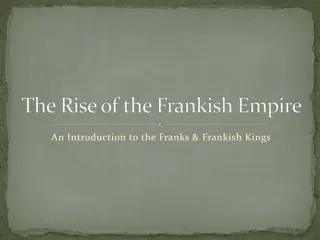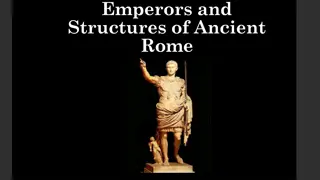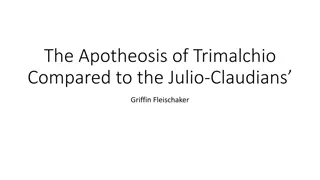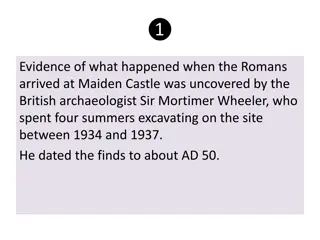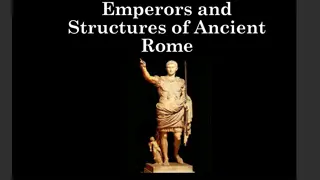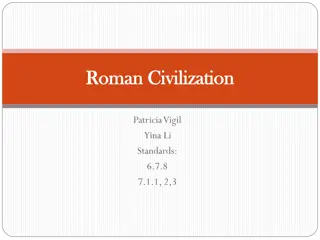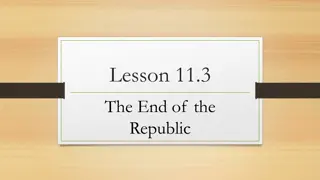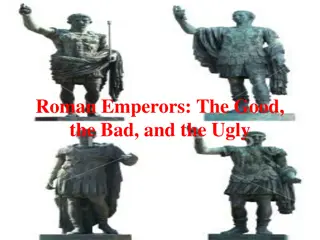Roman Political History: From Rise of Pompey to Reign of Augustus
In the tumultuous period of Roman history from the rise of Pompey to the reign of Augustus, we witness pivotal events such as the Alliance of the First Triumvirate, the civil war between Pompey and Julius Caesar, Caesar's assassination, the rise of Octavian, and the establishment of the Second Triumvirate. The narrative is marked by power struggles, alliances, dictatorships, and the division of the empire between Octavian and Antony. Stoicism and Roman values play a significant role, emphasizing duty over desire and endorsing divination.
Download Presentation

Please find below an Image/Link to download the presentation.
The content on the website is provided AS IS for your information and personal use only. It may not be sold, licensed, or shared on other websites without obtaining consent from the author.If you encounter any issues during the download, it is possible that the publisher has removed the file from their server.
You are allowed to download the files provided on this website for personal or commercial use, subject to the condition that they are used lawfully. All files are the property of their respective owners.
The content on the website is provided AS IS for your information and personal use only. It may not be sold, licensed, or shared on other websites without obtaining consent from the author.
E N D
Presentation Transcript
Pre 4th Century E sphoros (Dawn-bringer) Post 4thCentury Aphrodit s ast r (Aphrodite s star) Ar os ast r (Ares star) Pyroeis (Fiery)
155 Embassy of Greek philosophers (Aristotelian, Stoic, Skeptic) to Rome Riots between populist and conservative factions 121 107-100 Militia restructured as standing army 87-85 Riots between supporters of generals Marius (populist) and Sulla (conservative) Dictatorship of Sulla 82-78 77-71 Rise to power of Pompey (conservative) 60 Alliance (First Triumvirate) of Pompey, J. Caesar (populist) and Crassus ($) Tensions between Pompey and J. Caesar civil war; J. Caesar victorious Assassination of Caesar by republican faction headed by M. Brutus 49-47 44 42 Deification (katasterism) of J. Caesar by Octavian 43 Alliance (Second Triumvirate) of M. Antony (populist), Octavian (conserva-tive) and Lepidus ($) Empire divided between Antony (East) and Octavian (West) 40-32 30 Antony defeated by Octavian at Battle of Actium 27 Octavian receives title of Augustus and lifetime absolute power (imperium)
Stoicism and Roman Values collective vs. individual good emphasis on duty (officium) over desire (amor) endorsement of divination
155 Embassy of Greek philosophers (Aristotelian, Stoic, Skeptic) to Rome Riots between populist and conservative factions 121 107- 100 87-85 Militia restructured as standing army Riots between supporters of generals Marius (populist) and Sulla (conservative) Dictatorship of Sulla 82-78 77-71 Rise to power of Pompey (conservative) 60 Alliance (First Triumvirate) of Pompey, J. Caesar (populist) and Crassus ($) Tensions between Pompey and J. Caesar civil war; J. Caesar victorious Assassination of Caesar by republican faction headed by M. Brutus 49-47 44 42 Deification (katasterism) of J. Caesar by Octavian 43 Alliance (Second Triumvirate) of M. Antony (populist), Octavian (conserva-tive) and Lepidus ($) Empire divided between Antony (East) and Octavian (West) 40-32 30 Antony defeated by Octavian at Battle of Actium 27 Octavian receives title of Augustus and lifetime absolute power (imperium)
155 Embassy of Greek philosophers (Aristotelian, Stoic, Skeptic) to Rome Riots between populist and conservative factions 121 107- 100 87-85 Militia restructured as standing army Riots between supporters of generals Marius (populist) and Sulla (conservative) Dictatorship of Sulla 82-78 77-71 Rise to power of Pompey (conservative) 60 Alliance (First Triumvirate) of Pompey, J. Caesar (populist) and Crassus Tensions between Pompey and J. Caesar civil war; J. Caesar victorious Assassination of Caesar by republican faction headed by M. Brutus 49-47 44 42 Deification (katasterism) of J. Caesar by Octavian 43 Alliance (Second Triumvirate) of M. Antony (populist), Octavian (conserva-tive) and Lepidus Empire divided between Antony (East) and Octavian (West) 40-32 30 Antony defeated by Octavian at Battle of Actium 27 Octavian receives title of Augustus and lifetime absolute power (imperium)
Antiochus I Commagene (ruled 69-31 BCE) 3 August 62 BCE Antiochus Epiphanes Theos
155 Embassy of Greek philosophers (Aristotelian, Stoic, Skeptic) to Rome Riots between populist and conservative factions 121 107- 100 87-85 Militia restructured as standing army Riots between supporters of generals Marius (populist) and Sulla (conservative) Dictatorship of Sulla 82-78 77-71 Rise to power of Pompey (conservative) 60 Alliance (First Triumvirate) of Pompey, J. Caesar (populist) and Crassus Tensions between Pompey and J. Caesar civil war; J. Caesar victorious Assassination of Caesar by republican faction headed by M. Brutus 49-47 44 42 Deification (katasterism) of J. Caesar by Octavian 43 Alliance (Second Triumvirate) of M. Antony (populist), Octavian (conserva-tive) and Lepidus Empire divided between Antony (East) and Octavian (West) 40-32 30 Antony defeated by Octavian at Battle of Actium 27 Octavian receives title of Augustus and lifetime absolute power (imperium)
In his retirement at Apollonia, Augustus [ca. 434 BCE] went with his friend Agrippa to visit Theogenes the astrologer in his gallery on the roof. Agrippa, who first consulted the fates, had great and almost incredible things predicted of him. Augustus therefore did not wish to make known his nativity, and persisted for some time in the refusal, from a mixture of shame and fear, lest his own fate should be predicted as inferior to that of Agrippa. When Augustus had been persuaded, however, to declare his nativity, Theogenes started up from his seat and paid him adoration. Not long afterwards, Augustus was so confident of the greatness of his destiny that he published his horoscope, and struck a silver coin bearing the image of Capricorn, the sign under which he was born. Suetonius
Astrology in Rome astronomical/astrological hierarchies and political hierarchies imperial endorsement widespread popularity personal astrologers for prominent/wealthy individuals political danger of astrological forecasts later bans on casting imperial horoscopes
M. Manilius (ca. 48 BCE 20 CE) astrological epic Astronomicon Stoic influence simplified astronomical model celestial events indicative The divine cosmos is voluntarily revealing itself both to mankind as a whole and to the poet in particular." horoscopic (catarchic) astrology system of ascendants, chronocrators, dodecatemories, decans, zodiacal geography
Types of Astrology General Astrology Kh0rography Genethlialogy (Natal Astrology) Catarchic (Inceptive, Horary) Astrology Interrogatory Astrology
Medical Astrology Whoever desires to know the condition of the patient at the beginning of the illness, and how long he will endure it, let him look at the Ascendant and the Moon and the Lord of the Ascendant and the Lord of the Moon's House and the Moon's conjoining with a star... and the Moon's dodecatemory. If the Lord of the Moon and the Lord of the Ascendant come from the decans, or if the decans aspect the Ascendant and the Moon and the Moon's dodecatemory, or if the Moon conjoins with the decans, then if the patient became ill at that hour and it is the beginning of his illness, it indicates recovery from his illness.... Dorotheus of Sidon, Pentateuch 5.41
Decans Leo, the first decan: its name is Pepisoth and it has the form of a woman holding in her right hand a thunderbolt, in her left a small bottle. It has wings from the middle of its body to its feet and a crown on its head. It rules the hands. Engrave it on the stone called heli- otrope, and set the plant libanotis underneath. Fix it inside any piece of jewelry and wear it. Abstain from boar's flesh. Hermes Trismegistus, The Sacred Book of Hermes
Major Aspects ascension sign rising in E at moment of birth 0-10 degrees conjunction sextile 60 degrees square 90 degrees trine 120 degrees opposition 180 degrees


![Read⚡ebook✔[PDF] Blood of the Provinces: The Roman Auxila and the Making of Pro](/thumb/20539/read-ebook-pdf-blood-of-the-provinces-the-roman-auxila-and-the-making-of-pro.jpg)

